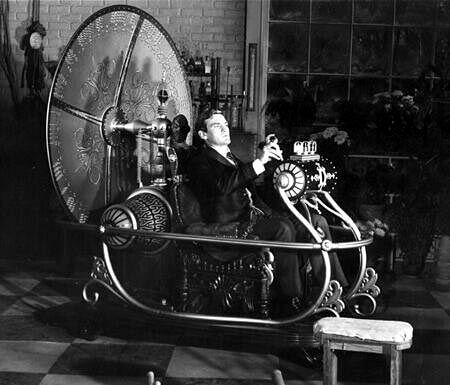Detecting time travelers on the Internet is remarkably difficult
Duo picks criteria and battles search engine limitations to spot anachronisms.

 ,
Robert Nemiroff and Teresa Wilson, but the answer they came up with was
pretty unsatisfying. Within the limit of their ability to check,
there's no sign of anyone with knowledge of the future living among us.
But the limitations are so large that the search doesn't really tell us
anything much.
,
Robert Nemiroff and Teresa Wilson, but the answer they came up with was
pretty unsatisfying. Within the limit of their ability to check,
there's no sign of anyone with knowledge of the future living among us.
But the limitations are so large that the search doesn't really tell us
anything much.It turns out that physicists have a bit of a history of trying to find out if a future human has sorted out time travel. In one of the more unusual article introductions I've ever read, Nemiroff and Wilson note:
In May of 2005, then graduate student A. Dorai at MIT publicized and held a convention for time travelers. No one claiming to come from the future showed up. S. Hawking did a similar experiment in July of 2012, holding a personal party for time travelers, but sending out the invitations only after the party. No one claiming to be a time traveler showed up.They decided to take a more general approach and see if a time traveler has accidentally left some information behind on the Internet by mentioning a topic that hadn't yet occurred. This proved to be much more challenging than you might imagine. For starters, they had to identify events that hadn't yet occurred but were likely to still be memorable in the distant future. One of the ones they came up with is Pope Francis. This makes sense in that Jorge Mario Bergoglio is the first Pope to choose that name, and records of papal nomenclature have been preserved for millennia.
But the second thing they chose was Comet ISON. Given that it never put on much of a show from Earth, its name is unlikely to be very prominent in the future.
Those two items were it, so this wasn't exactly an exhaustive search. But searching the Internet for indications of their use prior to their announcement or discovery turned out to limit things even further.
A search for use of the terms in hashtags came up blank. Facebook's search was limited to more recent results, so this method couldn't even be used. That service also allows you to backdate your postings, which means anyone could conveniently use it to look like they have foreknowledge of the future.
Search engines didn't help. Bing didn't enable them to search for any results prior to a specific date. And when the researchers attempted to use Google to find their name on webpages prior to their appearance, they discovered what appeared to be a flood of time travelers. But that was a bust. "Upon further inspection, however, all potentially prescient content on those webpages was clearly non-prescient," Nemiroff and Wilson write. "One prominent reason for this was the appearance of recent advertisements on older news stories."
In the end, the authors came up with a single discussion of Pope Francis that could potentially have been a time traveller dropping hints, but they did it in such a way that the text just appears to be speculative.
The duo also tried more specialized searches. Google Trends lets you look at what people are searching for and could capture a time traveller who's a little over-anxious about finding out when a specific event has occurred. But Trends didn't come up with any indication that anyone had ever searched for Comet ISON even after it was discovered. The authors eventually found out that Trends only registers terms that account for a substantial fraction of the searches performed; ISON never cleared that hurdle (which seems to reinforce that it was a questionable term to begin with). If there were a lone time traveller searching for Pope Francis early, it wouldn't have been apparent.
As a last check, the physicists turned to the Astronomy Picture of the Day server logs to check for someone searching for ISON early. It did show up, but other terms in those indicated that it did so by accident: "Each of these instances was related to extraneous information or misspellings, leaving no queries as possibly prescient."
In the end, the search was a bust. And that's probably good for their day job
 as physicists. As the duo notes, "Time travel to the past is
controversial at best and impossible according to conventional views of
the laws of physics."
as physicists. As the duo notes, "Time travel to the past is
controversial at best and impossible according to conventional views of
the laws of physics."The arXiv. Abstract number: 1312.7128 (About the arXiv).



No comments:
Post a Comment